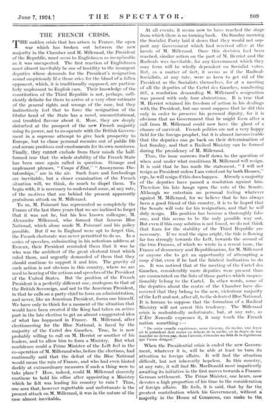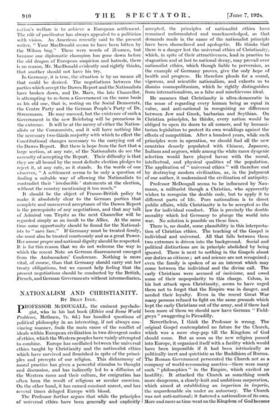THE FRENCH CRISIS.
THE sudden crisis that has arisen in France, the open war which has broken out between the new majority in the Chamber and M. Millerand, the President of the Republic, must seem to Englishmen as inexplicable as it was unexpected. The first reaction of Englishmen must almost inevitably be one of hostility to the insurgent deputies whose demands for the President's resignation sound suspiciously lit e those cries for the blood of a fallen opponent, which, it is traditionally supposed, are particu- larly unpleasant to English ears. Their knowledge of the constitution of the Third Republic is not, perhaps, suffi- ciently definite for.them to arrive at a very close estimate of the general rights and wrongs of the case, but they instinctively feel that to force the resignation of the titular head of the State has a novel, unconstitutional, and troubled flavour about it. More, they are deeply disturbed at the prospect of the new French majority using its power, not to co-operate with the British Govern- ment in a supreme attempt to give back prosperity to Europe, but to chase personal enemies out of public life and secure positions and emoluments for its own nominees. Finally, they cannot exclude from their minds the half- formed fear that- the whole stability of the French *State has been once again called in question. Strange • and unpleasant phrases', " Coups d'Etat," " Anonymous Dic- tatorships," are in the air. Such fears and forebodings are inevitable, but a closer examination of the French situation will, we think, do much to dispel them. To begin with, it is necessary to understand some, at any rate, of the motives that are behind the present apparently- gratuitous attack on M. Millerand.
To us, M. Poincare has represented so completely the France of the last three years that we are inclined to forget that it was not he, but his less known colleague, M. Alexandre Millerand, who formed that famous Bloc National, which alone made M. Poincare and his policy possible. But if we in England were apt to forget this, the French electorate was never permitted to do so. In a series of speeches, culminating in his notorious address at Evreux, their President reminded them that it was he who was the architect of the great electoral trust which ruled them, and urgently demanded of them that they should continue to support it and him. The gravity of such action is not obvious in this country, where we are used to hearing of the actions and speeches of the President of the United States. But the position of the French President is a perfectly different one, analogous to that of the British Sovereign, and not to the American President, in that he calls on a party chief to form an administration, and never, like an American President, forms one himself.
We have only to think for a moment of the situation that would have been created if the King had taken an active part in the late election to get an almost exaggerated idea of what has happened in France. - M. Millerand, after electioneering for the Bloc National, is faced by the majority of the Cartel des Gauehes. True, he is now probably willing to call on M. Herriot or another of his leaders, and to allow him to form a Ministry. But what confidence could a Prime Minister of the Left feel in the co-operation of M. Millerand who, before the elections, had continually said that the defeat of the Bloc National would mean the ruin of France, and who had even hinted darkly at extraordinary measures if such a thing were to take place ? How, indeed, could M. Millerand sincerely continue to hold his office after appointing a Ministry which he felt was leading his country to ruin ? Thus, one sees that, however regrettable and unfortunate is the present attack on M. Millerand, it was in the nature of the case almost inevitable. At all events, it seems now to have reached the stage from which there is no turning back. On Sunday morning the Socialist Party laid it down that they would not sup- port any Government which had received office at the hands of M. Millerand. Once this decision had been reached, similar action on the part of M. Herriot and the Radicals was inevitable, for any Government which they may form will be wholly dependent on Socialist votes. But, as a matter of fact, it seems as if the Radical- Socialists, at any rate, were as keen to get rid of the President as the Socialists themselves, for at a meeting of all the deputies of the Cartel des Gauches, numbering 307, a resolution demanding M. Millerand's resignation was passed with only four abstentions. It is true that M. Herriot retained his freedom of action in his dealings with the President, but one must suppose that he did this only in order to preserve his personal dignity, for it is obvious that no Government that he might form after a call from M. Millerand could now have the ghost of a chance of survival. French politics are not a very happy field for the foreign prophet, but it is almost inconceivable that the deputies can go back on their determination of last Sunday, and that a Radical Ministry can be formed during the presidency of M. Millerand.
Thus, the issue narrows itself down to the question of when and under what conditions M. Millerand will resign. It is said that he has made the statement, " I will not resign as President unless I am voted out by both Houses," ergo, he will resign if this does happen. Already a majority of the deputies have passed a resolution against him. Therefore his fate hangs upon the vote of the Senate. Although we entertain no personal feeling whatever against M. Millerand, for we believe that he has always been a good friend of this country, it is to be hoped that the Senate will vote for his resignation, and that he will duly resign. His position has become a thoroughly false one, and this seems to be the only possible way out.
But even if this easy solution is not found, we do not think that fears for the stability of the Third Republic are necessary. If we read the signs aright, the tide is flowing far too strongly towards the Left, towards the second of the two Frances, of which we wrote in a recent issue, the France of democracy and Republicanism, for M. Millerand or anyone else to get an opportunity of attempting a coup d'etat, even if he had the faintest inclination to do so. It was noticed that at the meeting of the Cartel des Gauches, considerably more deputies were present than are enumerated on the lists of those parties which unques- tionably belong to the Cartel. In other words, some of the deputies about the centre of the Chamber have dis- coN-Tred that they belong to the new, victorious majority of the Left and not, after all, to the defeated Bloc National.
It is. human to .suppOse that the forMation of a Radical Ministry will not arrest this tendency. The Millerand crisis is undoubtedly unfortunate, but, at any rate, as L'Ere Nouvelle expresses it, it may teach the French nation something :- " De cette cruelle experience, nous tirerons, du rooms, uno lecon oh le president doit rester en dehors de la melee, oil is dna* do son mandat ne devra pas, clans l'avenir, s'etendre au dela de Is legislature qui l'aura designe."
When the Presidential crisis is ended the new Govern- ment, whatever it is, will be able at least to turn its attention to foreign affairs. It will find the situation difficult, but not inherently hopeless. In this country, at any rate, it will find Mr. MacDonald most impatiently - - its initiative . awaiting in the first moves towards a Franco- German settlement. The Prime Minister, one hears, now • devotes a high proportion of his time to the consideration of foreign affairs. He feels, it is said, that by far the greatest contribution which his. Government, without majority in the House of Commons, can make to the nation's welfare is to achieve a European settlement.
The role of pacificator has always appealed to a politician with vision. An American recently said to the present writer, " Your MacDonald seems to have been bitten by the Wilson bug." These were words of ill-omen, but because one diplomatic champion has gone down before the old dragon of European suspicion and hatreds, there is no reason, Mr. MacDonald evidently and rightly thinks, that another should not have his try.
In Germany, it is true, the situation is by no means all that could be desired. The negotiations between the parties which accept the Dawes Report and the Nationalists have broken down, and Dr. Marx, the late Chancellor, is attempting to re-form a Government'on the same basis as his old one, that is, resting on the Social Democrats, the Centre Party and the German People's Party of Dr. Stresemann. He may succeed, but the existence of such a Government in the new Reichstag will be precarious in the extreme. It will be at the mercy of either the Nation- alists or the Communists, and it will have nothing like the necessary two-thirds majority with which to effect the Constitutional changes necessary to the carrying out of the Dawes Report. But there is hope from the fact that a large section, at any rate, of the Nationalists do see the necessity of accepting the Report. Their difficulty is that they are all bound by the most definite election pledges to reject it, at any rate, as it stands. In the words of one observer, " A settlement seems to be only a question of finding a suitable way of allowing the Nationalists to contradict their ' irreducible ' statements at the election, without the country mentioning it too much."
It should be the object of Franco-British policy to make it absolutely clear to the German parties that complete and unreserved acceptance of the Dawes Report is the prerequisite of any negotiations, and that any talk of Admiral von Tirpitz as the next Chancellor will be regarded simply as an insult to the Allies. At the same time some opportunity should be found for the National- ists to " save face." If Germany must be treated firmly, she must also be treated courteously and as a great Power. Her amour propre and national dignity should be respected. It is for this reason that we do not welcome the way in which the recent Note on German disarmament emerged from the Ambassadors' Conference. Nothing is more vital, of course, than that Germany should carry out her treaty obligations, but we cannot help feeling that the present negotiations should be conducted by the British, French, and German Governments without intermediaries.











































 Previous page
Previous page